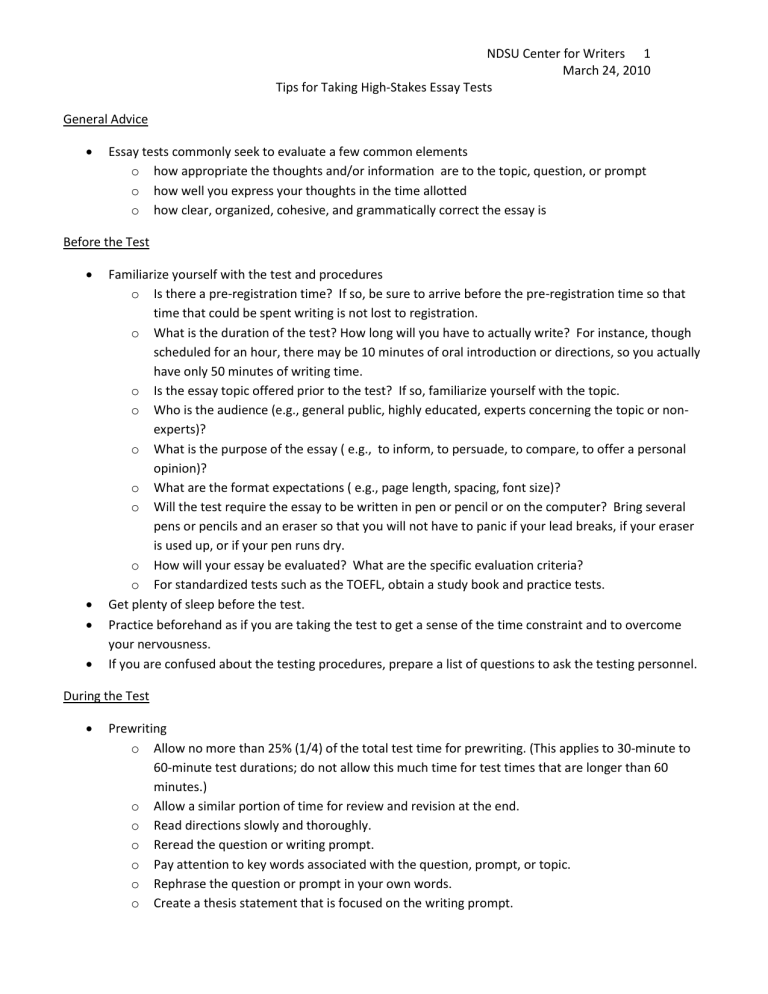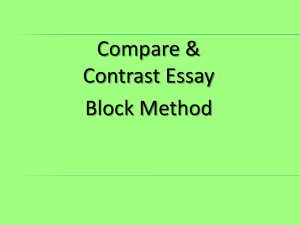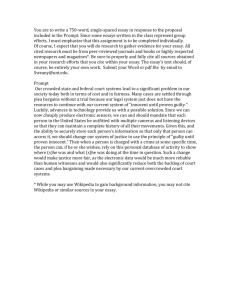Tips for Taking High

Tips for Taking High-Stakes Essay Tests
NDSU Center for Writers 1
March 24, 2010
General Advice
Essay tests commonly seek to evaluate a few common elements o how appropriate the thoughts and/or information are to the topic, question, or prompt o how well you express your thoughts in the time allotted o how clear, organized, cohesive, and grammatically correct the essay is
Before the Test
Familiarize yourself with the test and procedures o Is there a pre-registration time? If so, be sure to arrive before the pre-registration time so that time that could be spent writing is not lost to registration. o What is the duration of the test? How long will you have to actually write? For instance, though scheduled for an hour, there may be 10 minutes of oral introduction or directions, so you actually have only 50 minutes of writing time. o Is the essay topic offered prior to the test? If so, familiarize yourself with the topic. o Who is the audience (e.g., general public, highly educated, experts concerning the topic or nonexperts)? o What is the purpose of the essay ( e.g., to inform, to persuade, to compare, to offer a personal opinion)? o What are the format expectations ( e.g., page length, spacing, font size)? o Will the test require the essay to be written in pen or pencil or on the computer? Bring several pens or pencils and an eraser so that you will not have to panic if your lead breaks, if your eraser is used up, or if your pen runs dry. o How will your essay be evaluated? What are the specific evaluation criteria? o For standardized tests such as the TOEFL, obtain a study book and practice tests.
Get plenty of sleep before the test.
Practice beforehand as if you are taking the test to get a sense of the time constraint and to overcome your nervousness.
If you are confused about the testing procedures, prepare a list of questions to ask the testing personnel.
During the Test
Prewriting o Allow no more than 25% (1/4) of the total test time for prewriting. (This applies to 30-minute to
60-minute test durations; do not allow this much time for test times that are longer than 60 minutes.) o Allow a similar portion of time for review and revision at the end. o Read directions slowly and thoroughly. o Reread the question or writing prompt. o Pay attention to key words associated with the question, prompt, or topic. o Rephrase the question or prompt in your own words. o Create a thesis statement that is focused on the writing prompt.
NDSU Center for Writers 2
March 24, 2010 o Make a list of possible main points on scratch paper, if provided, or in a margin or on the back of the directions. o Organize the list of main points, selecting the strongest and eliminating non-essential points.
Drafting o Be aware of your time, but do not be overly concerned with the time. Testing personnel will often keep track of the time and note remaining time for you. You should check the clock after each section of the paper has been written so you do not run out of time before adding an appropriate conclusion or giving yourself time to review and revise the essay. o Stick to the main point or focus of the essay question or prompt and the genre of essay. o Avoid using personal opinion too often in informational essays or include information that is not directly related to the prompt. o Include an introduction to the topic
Starting with the general topic or context of the issue and narrowing to a thesis is often appropriate.
Keeping the introduction short is usually best to save time and space.
If you want to write the body first, leave space for the introduction and come back to it later.
Make sure your introduction and conclusion "match" in content but do not use the same wording (i.e., stay on track—do not end up on another topic) o If the test requires traditional essay format, place your thesis at the end of the first paragraph.
Some writers mention their main points in the thesis (e.g., X should be outlawed because it is unethical, expensive, and unfair.)
Some writers save the main points for the paragraphs (e.g., An analysis of x reveals three important reasons to outlaw the practice. ¶ The first reason is that x is unethical.) o Start with the most important point(s), in case you run out of time. o Be sure each paragraph starts with a transition and a topic sentence (e.g., In addition, X is necessary because...) o Add sufficient details (e.g., examples, illustrations, facts) to support your topic sentences. o Include a short conclusion that reminds readers of your main point (thesis) and provides a final thought or course of action.
Revising and proofreading o Plan for at least 5 minutes of review and revision. o When making revisions in pen, strike (cross out) edited text and write the revision neatly. Starting over on a new or fresh draft is NOT recommended. o Make sure that all words are spelled and used correctly, that all sentences are concise, complete, and grammatically correct, and that punctuation is appropriate.
References
Hodges, John C. The Writer’s Harbrace Handbook. Fort Worth: Harcourt College Publishers, 2001. 345-352. Print.
Raimes, Ann and Maria Jerskey. Keys for Writers. Sixth Edition. Boston: Wadsworth, Cengage Learning, 2011. 81-82. Print.
Trimbur, John. The Call to Write. Brief Fifth Edition. Boston: Wadsworth, Cengage Learning, 2011. 585-595. Print.
VanderMey, Randall, Verne Meyer, John Van Rys, and Pat Sebranek. COMP: Write. Instructor’s Edition. Boston: Wadsworth, Cengage
Learning, 2011. 199-203. Print.








